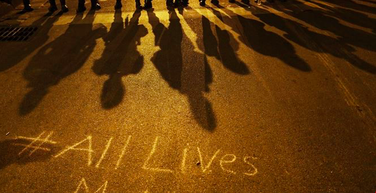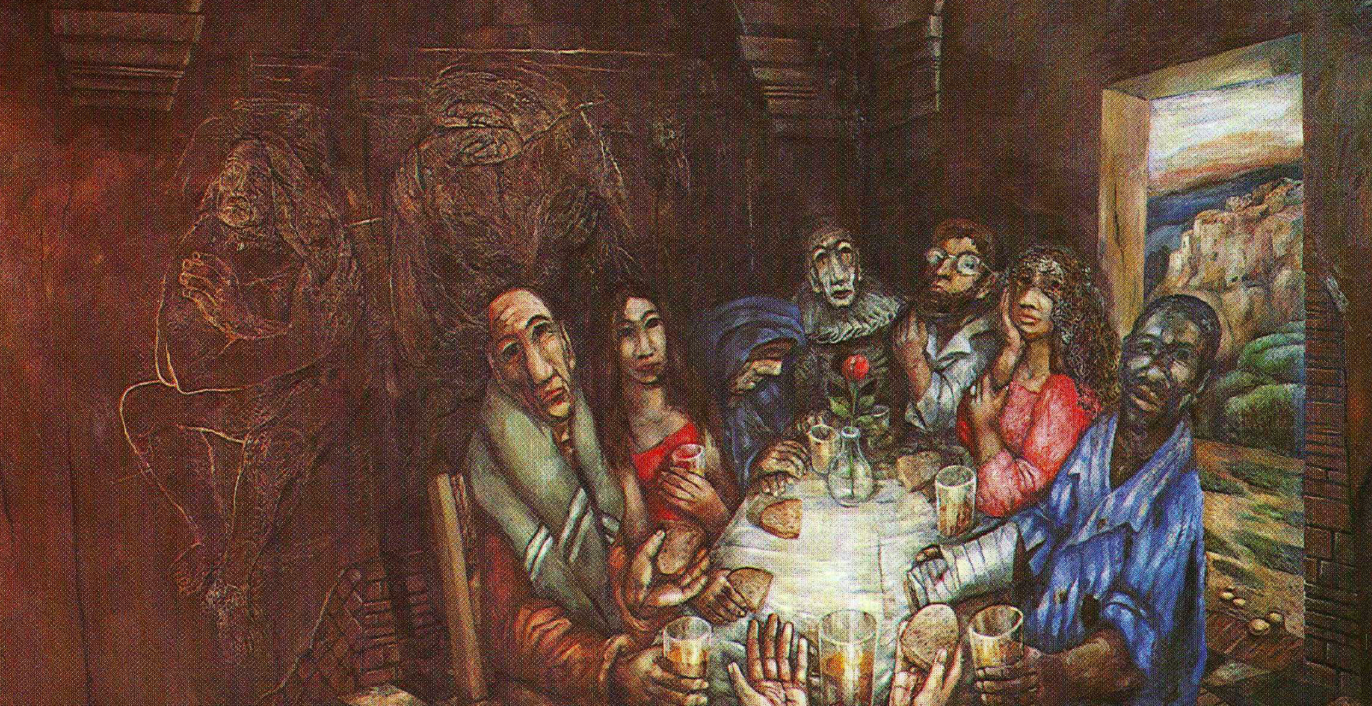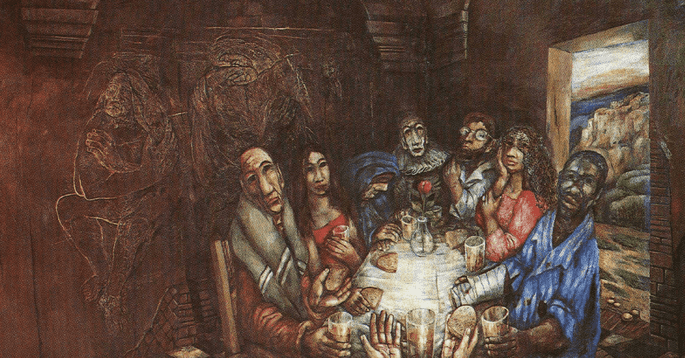 When we hear “All Lives Matter" or “Black Lives Matter," no matter who is hearing the phrase, we tend to hear it politically first, with a whole set of pre-answered assumptions about history, culture, and race, and, as well, with suspicion of some assumed social and/or political agenda behind it. We agree (cheer) or disagree (counter) depending on our own agenda, what we fear, or what we feel the need to protect (or maybe exploit). I get this. It is interesting when Jesus likened the first command to love God with all we got and have, he, then, didn't say, “and love everyone because all lives matter.” No. He was actually very specific, “Love your neighbor.” Of course, we know he didn't just mean the one living next door. Yet saying “neighbor” gave the command a specific definition, even a demographic, and yes, an assumed religious view, which, then, forced everyone to focus on “who is my neighbor?” See—upon hearing the command, it became even more specific. I believe we, that is, Christians, need to reconsider why the hashtag “Black Lives Matter” actually matters (lay aside the political organization here, BLM, and think of actual people) and that we, particularly as Christians, should embrace it. Herein is the issue—for the Christian. You see, the seemingly all-inclusive phrase “All Lives” is not necessarily, well, all inclusive anyway. “All Lives” is predicated on what one means by “Lives” and who fits within its perimeters. In early America, if the framers were to have used “All Lives Matter” instead of “all men,” you can (or should be able to) see why this matters.
Some, in arguing for and defending “All Lives Matter” over against “Black Lives Matter,” make reference that our Declaration of Independence states “all men are created equal.” Although “all” probably referenced “more than just royalty (i.e., the English monarch and royal family), Lords, and magistrates” more than likely “all" reenforced the connotation of those who were being taxed without representation—that is, the colonists in the new world—and not just Englishmen across the pond. “All” gave “men” something specific to reference. However, in the end, there is little difference between “All Lives” or (“all men”) matter and simply “Lives” (“men”) matter. You must understand, it doesn’t really matter what “All” means. Everything rests on what “Lives" (“men”) means—and this is what matters. Nonetheless, at that time, hearing what our framers had written, the hearers would, without any moral compass adjustment or contemplation, understood what was meant by “men” (i.e., “Lives”). Of course, we now affirm that “all men are created equal.” However, not “all men” (i.e., “All Lives”) were actually created equal—at that time. Between the “savages” (i.e., the Indians) referenced later in the Declaration of Independence and, even still later, in our US Constitution and Bill of Rights, that “slaves” were only partially counted (for they were property, not lives), we know that “men” actually did not mean “all living and breathing homo sapiens.” (Which negates the “all” as an inclusive adjective.) In fact, most of the references to “men” (and do notice is does say “men” and not human beings—and don't go generalizing that to them “men” meant “men and women” for it did not as a legal term nor as a socially accepted definition for a person) and the use of the word “rights” had “land-owners” in mind. It would take time for our own US Constitution and Bill of Rights to move past application to simply “land-owners” to women and children and, then, to the general population of US Citizens, and even more time to include “slaves” (i.e., free and bond black and other non-european-whites). It would take time for the idea that “men” (i.e., “Lives”) being property was understood personally and legally as immoral. So, you see, not all “Lives” (i.e., not “all men”) are, necessarily, considered “Lives.” This is why a narrow, more specific, clarifying, preceding word should be embraced. Like when Jesus said “neighbor.” When Jesus had reclined at Levi's house as the honoree of a banquet-meal, he reenforced specifically why he had come into this world. We read in Luke 5:
Please don't, as some have, spiritualize what Jesus said, twisting his words to somehow mean “everyone is a sinner, some just don't realize it.” Heavens no. While I agree “the righteous” are sinners here in this text and agree that we all fall short of the glory of God (Romans 3:23), Jesus was being very specific: “tax collectors,” those Jewish traitors working for the Romans and “sinners,” those uneducated and ignorant of the law of Moses–this are the ones here that matter. The “righteous” here would have been understood as those educated and the temple-religious elite who despised “sinners” as unclean and impure. So, here we have Jesus being specific. You see how this works. Even Jesus did it. If hashtags had existed in those days, Jesus would not have said #AllLivesMatter, but #TaxCollectorsandSinnersLivesMatter.
At this point, I am more comfortable being specific for the concept “Lives Matter.” For those fighting the good fight against abortion, as an example, this should be a no-brainer, for we understand “All Unborn Lives in the Womb Matter.” You see how that works? Thus, I am for #BlackLivesMatter and #BlackWomenLivesMatter and #Under-resourcedLivesMatter and #MyNeighborMatters (see what I did there?). The problem is with “Lives,” not with the “All” that comes before it. And, that is why we need specifics “Lives” after the “All” because it actually matters. *See previous blog post, The church is God's space to make change: #Wives/WomenLivesMatter, #ChildrenLivesMatter, and #SlavesLivesMatter.
0 Comments
Most take what Jesus says here in a self-protecting and spiritualized manner as if Jesus said, “I have not come to call the [self] righteous but [all] sinners [that is, those who recognize they are sinners] to repentance.” But this is not what Jesus said nor meant at all. “Righteous” and “sinners” are titles, stock terms, totally recognizable to the audience at that party. “Righteous” are those who keep the law of Moses, who have recognized status and position in and among Israelites; more narrowly to temple leadership and Jewish leaders of the Pharisees and Sadducees. “Sinners,” on the other hand, are the uneducated in the law of Moses, shepherds, outcasts, the disfranchised, Jewish tax-collectors for Rome, the working class, the poor, beggars, and slaves. This is made clearer by the Pharisees and Scribes pointing out, “Why do you eat and drink with tax collectors and sinners?” One cannot get around the social and cultural location embedded in this: The Jewish tax-collector for Rome, Levi puts on a banquet-meal for Jesus, who is to be the honored guest and symposium speaker for the evening. Jesus clearly states that he had come to call [probably the idea here, given the setting, "invited" to Jesus’ banquet-meal table], not the Jewish temple leadership, but social and religious outcasts. Jesus describes his banquet-meal and table as one of social leveling and transformation, along with the purposeful association of those considered outcasts and disenfranchised. We tend to generalize and uproot Jesus’ terms the “righteous” and “sinners,” so as to keep our categories of people comfortably and neatly in place. But in the end, Jesus still upsets our social categories, for this is the nature of the gospel of the kingdom. We need, in light of this text, to rethink "church" and "evangelism" and the importance use of meal and table as a venue for creating new social spheres and acceptance.
“The Pharisees and their scribes began grumbling at His disciples, saying, ‘Why do you eat and drink with the tax collectors and sinners?’” (Luke 5:30). Was struck this morning in my daily Bible reading concerning the phrase “tax collectors and sinners.” If we, that is the church (the body of Christ) that is now the presence of the ascended Jesus (that is his body in a place), how is it that we (not as individuals, which is a wholly modernist and ‘merican notion of church applied to the nature of the Christian life, i.e., replacing “wēs” with “I”) are not at a place--in a space--where we are accused of “eating and drinking” (there’s the idea of meals again) with “tax collectors and sinners”?
Instead, we are safely tucked into a building designed and with habits to distinguish who's in and who's out, where all leveling is errased, and we have power over guests; a place where we can escape being aligned with the “Son of Man” and being maligned as a gluttonous group and drunkards, friends “with tax collectors and sinners.” And, gathered in a space that is, in many places, not at all welcoming (easily accessible by design and by default) to “tax collectors and the sinners” to come near to find Jesus and to listen to him. Now such association with the likes of these people and populations, that is the equivalent to “tax collectors and sinners,” is relegated to church programs outside of the practice (i.e., worship) of the body, to specialists and volunteers, and carefully guarded and designed events. (Don't get me wrong, I know it is important to have worship time—but the early church met in homes that allowed for a mixture of believing and unbelieving to be present, both around the table and within eye-sight and ear-shot.) I am impressed, however, with the idea, amid the wider reading of the New Testament, that this is a church problem, not a volunteer or scheduling problem. These texts (and way too many like them, e.g., Matthew 9:9–13) are ignored as texts to be applied to the body of Christ (local). How does the body of Christ, not individual Christians severed, apart from the gathered body—on their own time and amid their own convictions and conscience and resources—but, the church be Jesus in this way so that “tax collectors and sinners” are seated at the table in his midst? Perhaps, then, we will, once again be accused of eating and drinking and associated with the marginal and despised, tax collectors and the sinners. Rethinking church. |
AuthorChip M. Anderson, advocate for biblical social action; pastor of an urban church plant in the Hill neighborhood of New Haven, CT; husband, father, author, former Greek & NT professor; and, 19 years involved with social action. Archives
February 2024
Categories
All
|
Pages |
More Pages |
|


 RSS Feed
RSS Feed